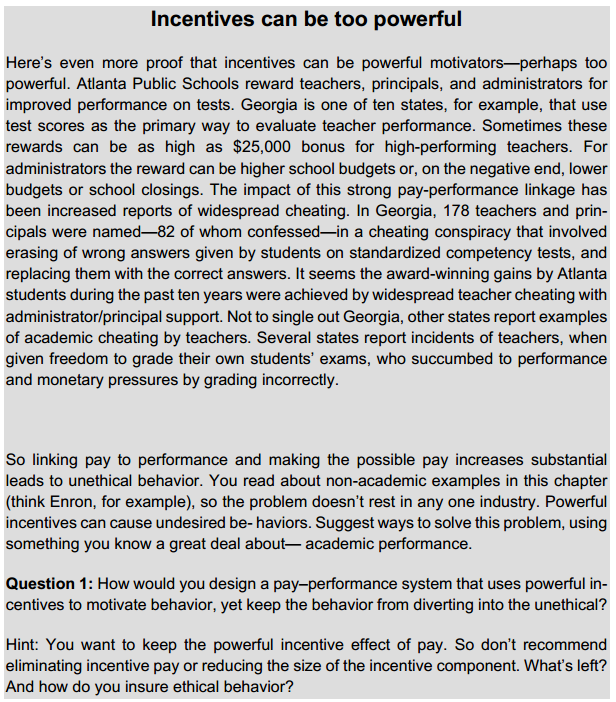and monetary pressures by grading incorrectly. So linking pay to performance and making the possible pay increases substantial leads to unethical behavior. You read about non-academic examples in this chapter (think Enron, for example), so the problem doesn't rest in any one industry. Powerful incentives can cause undesired be- haviors. Suggest ways to solve this problem, using something you know a great deal about- academic performance. Question 1: How would you design a pay-performance system that uses powerful in- centives to motivate behavior, yet keep the behavior from diverting into the unethical? Hint: You want to keep the powerful incentive effect of pay. So don't recommend eliminating incentive pay or reducing the size of the incentive component. What's left? And how do you insure ethical behavior?
and monetary pressures by grading incorrectly. So linking pay to performance and making the possible pay increases substantial leads to unethical behavior. You read about non-academic examples in this chapter (think Enron, for example), so the problem doesn't rest in any one industry. Powerful incentives can cause undesired be- haviors. Suggest ways to solve this problem, using something you know a great deal about- academic performance. Question 1: How would you design a pay-performance system that uses powerful in- centives to motivate behavior, yet keep the behavior from diverting into the unethical? Hint: You want to keep the powerful incentive effect of pay. So don't recommend eliminating incentive pay or reducing the size of the incentive component. What's left? And how do you insure ethical behavior?
Understanding Management (MindTap Course List)
10th Edition
ISBN:9781305502215
Author:Richard L. Daft, Dorothy Marcic
Publisher:Richard L. Daft, Dorothy Marcic
Chapter12: Motivating Employees
Section: Chapter Questions
Problem 2AL
Related questions
Question
Question atatched

Transcribed Image Text:Incentives can be too powerful
Here's even more proof that incentives can be powerful motivators-perhaps too
powerful. Atlanta Public Schools reward teachers, principals, and administrators for
improved performance on tests. Georgia is one of ten states, for example, that use
test scores as the primary way to evaluate teacher performance. Sometimes these
rewards can be as high as $25,000 bonus for high-performing teachers. For
administrators the reward can be higher school budgets or, on the negative end, lower
budgets or school closings. The impact of this strong pay-performance linkage has
been increased reports of widespread cheating. In Georgia, 178 teachers and prin-
cipals were named-82 of whom confessed-in a cheating conspiracy that involved
erasing of wrong answers given by students on standardized competency tests, and
replacing them with the correct answers. It seems the award-winning gains by Atlanta
students during the past ten years were achieved by widespread teacher cheating with
administrator/principal support. Not to single out Georgia, other states report examples
of academic cheating by teachers. Several states report incidents of teachers, when
given freedom to grade their own students' exams, who succumbed to performance
and monetary pressures by grading incorrectly.
So linking pay to performance and making the possible pay increases substantial
leads to unethical behavior. You read about non-academic examples in this chapter
(think Enron, for example), so the problem doesn't rest in any one industry. Powerful
incentives can cause undesired be- haviors. Suggest ways to solve this problem, using
something you know a great deal about- academic performance.
Question 1: How would you design a pay-performance system that uses powerful in-
centives to motivate behavior, yet keep the behavior from diverting into the unethical?
Hint: You want to keep the powerful incentive effect of pay. So don't recommend
eliminating incentive pay or reducing the size of the incentive component. What's left?
And how do you insure ethical behavior?
Expert Solution
This question has been solved!
Explore an expertly crafted, step-by-step solution for a thorough understanding of key concepts.
This is a popular solution!
Trending now
This is a popular solution!
Step by step
Solved in 3 steps

Recommended textbooks for you

Understanding Management (MindTap Course List)
Management
ISBN:
9781305502215
Author:
Richard L. Daft, Dorothy Marcic
Publisher:
Cengage Learning

Management, Loose-Leaf Version
Management
ISBN:
9781305969308
Author:
Richard L. Daft
Publisher:
South-Western College Pub

Understanding Management (MindTap Course List)
Management
ISBN:
9781305502215
Author:
Richard L. Daft, Dorothy Marcic
Publisher:
Cengage Learning

Management, Loose-Leaf Version
Management
ISBN:
9781305969308
Author:
Richard L. Daft
Publisher:
South-Western College Pub